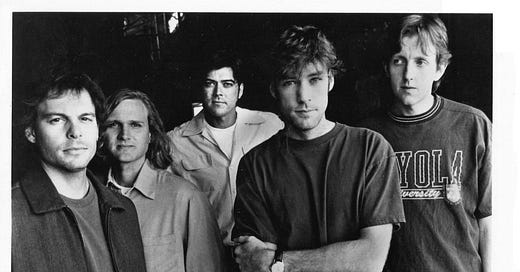Modern Rock No. 1s: Gin Blossoms and "Found Out About You"
Composed at nearly double-time in its initial recording, "Found Out About You" reflects the urgency Doug Hopkins must've felt - and the heartbreak he wrote about - frequently.
Gin Blossoms - “Found Out About You”
Weeks atop the Billboard Modern Rock chart: 1 week (January 15, 1994)
Previous Modern Rock #1 hit: Pearl Jam - “Daughter”
Next Modern Rock #1 hit: Nirvana - “All Apologies”
Billboard Hot 100 chart toppers during this time:
Mariah Carey - “Hero” (4 weeks, 12/25/93 to 1/15/94)
Editor’s Note: It gives me great pleasure to introduce from the tremendously interesting and entertaining newsletter to discuss this week’s Modern Rock Tracks #1 hit, “Found Out About You” by Gin Blossoms. Many moons ago, I was able to participate in his very fun Tuesday tradition “Tune Tag,” and we’ll be revisiting that experience in the coming weeks. For now, sit back and enjoy Brad’s review of Gin Blossoms and their only #1 hit.
First, a plug for : “The Best Music History Writing Online!”-Classic Rock, Prog, Pop, & Punk, 1960s to the Present! Music exploration, commentary, analysis & memories! Home of Tune Tag + popular Audio Autopsy and Inside Tracks + Stephen Michael Schwartz Stories!
“An infectious brand of sun-baked jangle-pop soaked in darkness.”—Richard Turgeon
Did you love me only in my head?
There were things you said and did to me,
They seem to come so easily;
The love I thought I’d won, you give for free.—Doug Hopkins, “Found Out About You”
Genius.com: “This song is about someone who has not been able to get over a relationship and is stuck on one person. The person often reflects on the past memories to cope with this feeling. His is gutted with sadness, hearing rumors that the woman he is in love with is hooking up with other guys.”
Emotionally troubled for years (and an alcoholic), Hopkins was kicked out of Gin Blossoms after his drinking problems got out of hand during recording sessions for their debut A&M Records album. After failed attempts at getting sober, December 5, 1993 was his last day. He was 32.
Gin Blossoms Germinate
The band formed in 1987 in their Tempe, Ariz., hometown (a suburb of Phoenix). They developed a robust local following, and decided to pony up the dough to record their first album in 1989. Titled Dusted, it was produced by the band and Rich Hopkins (no relation, but a member of Tucson-based Sidewinders) released by Tucson’s San Jacinto Records.
On it were the Gin Blossoms’ first iterations of two of Hopkins’ songs, “Hey, Jealousy” and a break-neck-paced run-through of “Found Out About You,” likely spurred by only the wandering eye of a gal who done him wrong, and not the building wave of grunge about to break.
Lead singer, Robin Wilson, in 1994: “The first time we ever demo’d ‘Found Out About You,’ we knew it was a hit song. I remember that being a significant event in my mind, when we were in the studio doing that song. I was sitting out on my car and what I imagined to be a hit song was a bunch of kids dancing to it at the (Tempe dance club) Devil House (circa 1984):
“We were listening to it, and Bill (Leen, Blossoms bassist) looked over at me and said, ‘Hey, wow, this song is going to get you a lot of women, isn’t it?’ I was just like ‘Yeah, whatever.’”
“Without Doug and his songwriting, we never could have signed a record deal.”—Lead vocalist, Robin Wilson
Hit Songs Should Be Joyous Occasions
The band members, all born in the early- to mid-’60s, were raised on the unabashed melody-rich rockin’ pop of REM, Cheap Trick, Big Star, Tom Petty, and The Replacements. So, they had their template, and in Doug Hopkins, a guitarist/songwriter who could play it forward, who also gave the Blossoms a solid musical vehicle that might push away grunge’s new plaid-flannel army. And, he did it consistently and, seemingly, easily.
Gin Blossoms got the attention of the L.A.-based A&M Records in 1991. Pessimism seemed to become the byword for the band, as their first pass at their second album (their major label debut) came in way over budget and was nixed by label suits. Still, A&M allowed the band to produce a 5-song EP, Up and Crumbling (released in October 1991), to buy them all time to give their now-aptly-titled New Miserable Experience a second go (produced by the band and 2-time Grammy-winner, John Hampton).
It’s telling that the album was recorded at Memphis’s storied Ardent Studios, where power pop kingpins, Big Star, laid down their hallowed early-’70s tracks. Gin Blossoms didn’t end up there by accident.
Doug Hopkins was fired from the band after recording of the album had completed.

All parties were happy that A&M stuck with the band, as the now Hopkins-less Blossoms dropped the new album in August 1992. A&M re-released it in late summer ‘93, not only to indicate a new-found urgency by the label to promote the band, but to allow more artistic control by band members, particularly singer, Robin Wilson:
As he told Forbes in 2019, “I did insist that I have total control over the new cover. So what you see on New Miserable Experience, those are all my photographs. I did the layout, I handwrote all the lyrics and I made sure that I had control over that.”
“Lost Horizons” and “Mrs. Rita” were the first off the album to enjoy single releases, but were both given the radio cold shoulder. “Hey Jealousy” followed quickly in June ‘93, and became the band’s signature song, reaching #25 on the U.S. Billboard Hot 100 in 1993. It peaked at #24 in the UK, #28 in Australia, and #39 in Canada.
“Found Out About You”
Its composer, Doug Hopkins, had high hopes for making a hit. Wilson recalled that Hopkins was “very specific” about how the vocals for the song turned out.
The song was a favorite of the band’s, with both Wilson and drummer Phillip Rhodes naming it as Hopkins’s best song. As Rhodes commented to Faces Magazine in 1994, “In my opinion, that is the best song he ever wrote, and it is the best song on the record.”
Wilson revealed at the time, “I knew that song had to be the best vocal of my entire life. I knew that song had to be perfect, at least from my angle. Everybody else did it perfectly, and I had to rise up to the challenge as well....He wanted it to be a hit record and I’m glad it is; it’s a great song.”
Live, downtown Phoenix, January 2011:
Robin Wilson, Live, acoustic in-studio, Sirius/XM Satellite Radio, June 2022:
Angst in the Key of G
Final review: It’s hard to hear (and appreciate) the song and not think about Doug Hopkins, and more to the point, the emotional ache and the psychic pain he must’ve felt during his time with the band. Art is usually driven by the emotions of the artist, and one can only hope Doug appreciated the end-result his unfortunate heartache brought to this popular song.
Like so many transcendent songs in rock’s endless canon, the breaking of a heart is usually accompanied by ringing guitars and close-knit harmonies.
I had this CD in 1993, and immediately gravitated to the two hits….of course, “Jealousy” and, rapidly pulling alongside, and quickly surpassing it to become my favorite on the album, “Found Out About You.” When I visited karaoke bars virtually nightly a decade ago, I always sang “Found Out About You.” I gave a cursory pass to “Jealousy” and “Allison Road,” on occasion, but my GB karaoke go-to was certainly “Found Out About You.”
It’s got a gripping opening guitar figure, which taunts the listener toward the melodic candy that lurks within. A second guitar harmony line comes in before Wilson begins singing. Hopkins’ and Jesse Valenzuela’s jangling guitar lines continue throughout, likely echoing Doug’s jangled nerves that led to their composition.
Only for the chorus do barre chords finally arrive, and in no way are they obtrusive….they’re the fist against the wall we were expecting. Vocal harmonies are at once subdued and perfect, and Phillip Rhodes’ drumming is flawless throughout, as he effectively punctuates the chorus intro with attention-grabbing machine-gun rat-a-tats.
Knowing the band members’ love of the power pop forefathers, this song can easily slot into that sub-genre without apology. Into whichever genre pocket others place the band (alt, a less-surly grunge, or whatever), they are not power pop, but I’d have no problem ranking “Found Out About You” solidly into an all-time power pop Top 20. For songcraft, arrangement, and production (by Gin Blossoms and John Hampton)…..
Rating: 9.8/10
Chart Check
Other notable MRT chart songs from this time period
First, a huge thank you to
for lending his unique take on Gin Blossoms to Chart Chat this week! Please check out his publication early and often!As for this week’s Chart Check, we have two songs that peaked in the top 5 but hardly resonate these days.
“Purple Haze” by The Cure (#2): The Cure lent its unique sound to Stone Free: A Tribute to Jimi Hendrix, a 1993 album that featured a bunch of Hendrix covers, including his seminal “Purple Haze.” I’m really not the biggest fan of Hendrix, but the dude could play guitar, and you’d be best served listening to the original over and over before you dive too deep into The Cure’s “cover” of this song. While there are plenty of examples of covers that are as good or better than their originals, this one is not one of them, unless you’re a Cure fan, in which case you probably think it’s the best ever. Anyway, this song peaked at #2 behind Gin Blossoms, and then we never talked about it again.
“Kite” by Nick Heyward (#4): Nick Heyward, he of British rock fame from his brief stint in Haircut One Hundred, hit his U.S. alternative rock peak in 1994 for “Kite,” the only track of his to crack the Modern Rock Tracks chart. It’s a fine guitar-led ditty about kites or some such. It finished its run at #4 behind Gin Blossoms, and much like The Cure’s lackluster cover above, it faded into obscurity. Perhaps you’ll enjoy it!












I thought the Gin Blossoms would be THE band of the ‘90s, and beyond. It was devastating to hear about Hopkins’s death. Not only for him as a person, but also for all the potential songs that died with him. I held out that he would clean up and rejoin the band to fantastical accolades from fans and media. Perhaps the Universe had bigger plans for him in another realm. I like to think so.
First time hearing the version from the Dusted album. I like the rawer version of this song, as opposed to the more cleaned up finished product. But either version is a masterclass of jingle jangle goodness.